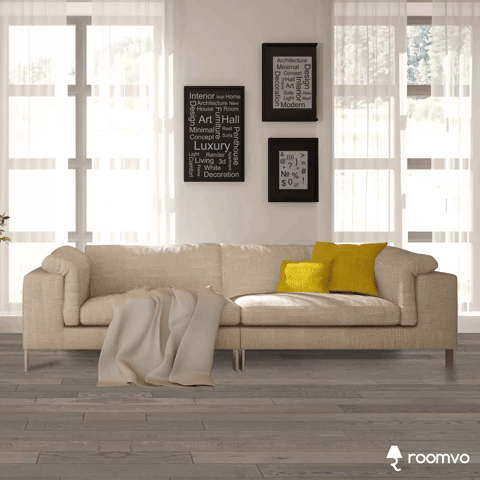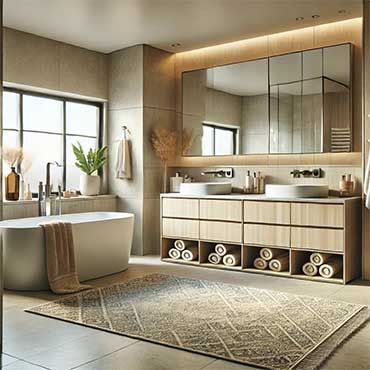
Ceramic Tile in the Bathroom: A Designer’s Guide to Luxury, Functionality, and Durability
Introduction: Transforming Bathrooms with Ceramic Tile
In the world of bathroom design, every choice—down to the last detail—has a significant impact on the room’s ambiance, usability, and aesthetic harmony. A bathroom is more than just a functional space; it's a retreat, a sanctuary where clients unwind. To enhance this experience, designers often lean towards durable and visually captivating materials like ceramic tile. Known for its versatility, ceramic tile effortlessly complements a range of design styles while providing practical benefits that make it particularly suitable for bathroom applications. In this article, we’ll explore the advantages of ceramic tile and evaluate its suitability for creating bathrooms that meet the high standards of today’s discerning designers and decorators.
Pros and Cons of Ceramic Tile in Bathroom Design
Pros of Ceramic Tile
Aesthetic Versatility: Ceramic tile comes in an array of colors, finishes, and textures, making it adaptable to various design narratives. From minimalist modern bathrooms to ornate classical styles, water-resistant can anchor the room’s aesthetic or act as a bold centerpiece.
Durability: Crafted from high-fired clay, ceramic tiles are incredibly resilient. They can withstand high-traffic, regular moisture exposure, and resist chipping, making them ideal for long-lasting bathroom flooring.
Moisture Resistance: Bathrooms are naturally high-moisture areas, and ceramic tile’s resistance to water makes it a safe and practical choice. This moisture resistance prevents damage over time, ensuring that your design retains its appeal for years.
Sustainability: Made from natural, abundant materials, ceramic tiles offer an eco-friendly option. Their longevity reduces replacement frequency, contributing to a sustainable design ethos.
Cons of Ceramic Tile
Cold Surface: Ceramic tile can feel cool underfoot, especially in colder climates. Designers may need to incorporate radiant floor heating to enhance comfort.
Installation and Labor Costs: While durable, ceramic tile installation can be labor-intensive, increasing both time and costs. It’s essential to work with skilled professionals to ensure flawless installation.
Potential for Slippage: Ceramic tiles, especially glossy or polished finishes, can become slippery when wet. Choosing a textured or matte tile can reduce this risk and improve bathroom safety.
9 Key Considerations When Choosing Ceramic Tile for Bathroom Flooring
Room Purpose
Bathrooms require materials that blend aesthetics with high functionality, especially given the moisture levels and frequent use. Ceramic tile’s water resistance and easy-to-clean surface make it suitable for wet environments. Opting for larger tiles minimizes grout lines, enhancing both hygiene and visual flow.
Design Style
Ceramic tile offers endless design possibilities, from sleek, neutral tones for a contemporary look to intricate patterns and bold colors for a more eclectic style. Its versatility allows designers to stay consistent with the bathroom’s overall theme, whether that leans toward Scandinavian minimalism, rustic charm, or modern luxury.
Durability
A durable flooring choice is essential in bathrooms, where wear and moisture exposure are constant. Ceramic tiles excel here, withstanding daily use without showing signs of deterioration. Their resilience against water and stains makes them a top choice for long-lasting beauty.
Moisture Exposure
Bathrooms are high-moisture environments, so water-resistant materials are necessary. Ceramic tile’s natural composition and high firing process render it highly resistant to moisture, ensuring longevity and reducing maintenance concerns, particularly when paired with a quality sealant on the grout.
Budget
Ceramic tile is available in a wide range of prices, allowing designers to find options that suit various budget levels without sacrificing quality or style. While installation costs can add up, the tile’s durability makes it a wise investment over time.
Subfloor Condition
A smooth, stable subfloor is essential for ceramic tile installation to prevent cracking. Before laying ceramic tiles, it’s crucial to ensure that the bathroom’s subfloor is even and properly prepared, minimizing future maintenance needs and enhancing the tiles' durability.
Eco-Friendliness
For eco-conscious clients, ceramic tiles are an excellent option due to their natural composition and minimal environmental impact. Many manufacturers are committed to sustainability, offering ceramic tiles made with recycled materials, which align with green building standards.
Soundproofing and Insulation
Ceramic tiles can amplify sound, which might affect the bathroom’s acoustics. Additionally, ceramic tiles can feel cool, especially in colder climates. Designers may want to consider additional soundproofing layers or underfloor heating to address these potential issues.
Health Considerations
Ceramic tile is a non-toxic material that doesn’t harbor allergens, making it ideal for bathrooms where hygiene is crucial. Its easy-to-clean surface prevents mold and mildew growth, contributing to a healthier bathroom environment.
The Impact of Ceramic Tile on Bathroom Design Elements
Color Scheme and Visual Appeal
Ceramic tile can significantly impact the bathroom’s color scheme. Designers can choose from subtle neutrals that harmonize with other elements or bold patterns that add visual interest and become focal points. The reflective quality of glossy ceramic tiles can also enhance lighting, adding depth and brightness to the space.
Style and Theme Coherence
Ceramic tile can seamlessly integrate with various styles, whether it’s a sleek, modern bathroom or a rustic, earthy space. Its versatility allows designers to maintain coherence between the bathroom and the rest of the home, enhancing the overall design narrative.
Texture and Feel
The texture of ceramic tile influences not only the aesthetic but also the sensory experience of the space. Matte, textured tiles offer a softer, slip-resistant surface ideal for wet areas, while glossy finishes add sophistication and visual depth, making the bathroom feel more spacious and luxurious.
Room Size Perception
Larger ceramic tiles with minimal grout lines can make a small bathroom feel more expansive by creating a continuous visual flow. Light-colored tiles also contribute to a brighter, airier feel, further enhancing the perception of space.
Comfort and Usability
Ceramic tile’s easy maintenance and water resistance make it a practical choice for bathrooms. Although it can feel cold underfoot, the addition of radiant heating can increase comfort, creating a warm and inviting retreat.
Acoustic Impact
Ceramic tile is relatively hard and can amplify sound. This might be a consideration in larger bathrooms or shared spaces, where additional soundproofing solutions, such as acoustic mats or rugs, may be needed to soften the acoustics.
Pattern and Focal Points
Ceramic tiles offer a wide range of patterns, from subtle textures to bold designs. A patterned tile floor can act as a focal point, grounding the bathroom’s design and adding an element of interest. For a more understated look, neutral or solid-colored tiles can serve as a seamless backdrop, allowing other elements to stand out.
Conclusion: Is Ceramic Tile Right for Your Bathroom Project?
For interior designers and decorators, ceramic tile presents an ideal blend of form and function for bathroom spaces. Its resilience, water resistance, and versatility make it a top choice, capable of adapting to a variety of styles and layouts. By selecting ceramic tile, designers can create bathrooms that not only meet practical demands but also deliver visual appeal that endures. The material’s sustainability and longevity further enhance its value, aligning with eco-friendly design principles.
Whether the aim is to craft a minimalist sanctuary or an opulent, spa-like retreat, ceramic tile provides the flexibility needed to bring any vision to life. With thoughtful selection and installation, ceramic tile can transform bathrooms into luxurious, functional spaces that align with clients’ design aspirations.
Choose Flooring Product : Area Rugs Ideas (2) : Ceramic/Porcelain Ideas (57) : Wood Flooring Ideas (9) : Laminate Flooring Ideas (3) : Vinyl/Resilient Ideas (5) : LVT/LVP Ideas (22) : Ceramic/Porcelain Ideas (57)

roomvo
Visualize Flooring In Your Bathroom!
Roomvo makes picking new floors easy. Take advantage of our room visualizer tool to see what your home will look like with any flooring products from our catalog. Just upload your photo to see your room come to life.
 Blog
BlogBathroom - Area Rugs
Elevate Bathroom Style with Area Rugs: Pros, Cons, and Design Insights
This article, crafted by Arabella Whitethorn, explores the use of bathrooms in bathrooms, discussing both their decorative potential and practical considerations. Designed for interior designers and decorators, it addresses nine critical design factors, from moisture resistance to style cohesion, helping readers understand when and how to incorporate area rugs in a bathroom setting. Whether enhancing acoustic impact or providing a focal point, area rugs can add elegance and warmth, making the bathroom a true sanctuary.
Learn More Blog
BlogBathroom - Art Deco
Transform Your Bathroom with Art Deco Flooring Elegance
Transforming a bathroom into an Art Deco-inspired haven requires careful attention to detail, with flooring serving as a foundational element in both functionality and design. This blog post by Arabella Whitethorn dives into the unique requirements of bathroom flooring, emphasizing how materials like durability and offer the perfect balance of durability, water resistance, and aesthetic appeal. Through a professional yet inspiring lens, the article explores how bold geometric patterns, polished finishes, and rich color palettes can align with the opulent, glamorous style of Art Deco interiors.
Addressing key considerations such as moisture exposure, budget, eco-friendliness, and design coherence, the post provides actionable insights tailored for interior designers and decorators. Whether working on a high-end renovation or a more modest project, this guide equips design professionals with the knowledge to select flooring that not only enhances the visual impact of a bathroom but also ensures practicality and longevity. With thoughtful advice and creative inspiration, the article helps readers create a sophisticated, functional retreat that captures the timeless allure of Art Deco design.
Learn More Blog
BlogBathroom - Carpeting
The Pros and Cons of Using Carpet in the Bathroom: A Designer's Guide
This blog post explores the pros and cons of using in bathroom designs, a choice that can add warmth and a unique aesthetic but also presents practical challenges. Aimed at interior designers and decorators, it delves into considerations like moisture resistance, durability, and maintenance, essential factors when choosing the right flooring for high-moisture environments. The article also addresses how carpeting impacts the bathroom's color scheme, style coherence, and acoustic quality, helping designers visualize how carpet could align with the room’s purpose and ambiance. With insights on suitable carpet materials and installation tips, this guide provides a comprehensive look at how to incorporate carpet in bathroom spaces while balancing style with functionality.
Learn More























